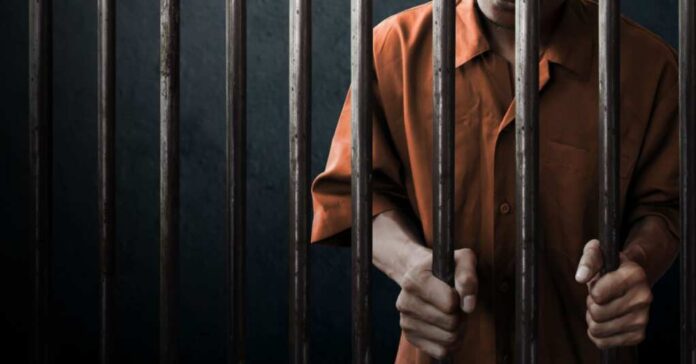Meet John Strand, a political prisoner from the January 6 charade whose only crime was being on Capitol Hill on the wrong day.
On January 6, Strand was working as a bodyguard for Dr. Simone Gold, who was in Washington, D.C., to give a speech about medical freedom and COVID-19. The speech was supposed to take place on Capitol grounds with a permit from Capitol Police. The event was canceled because too many people came to the Capitol after President Trump’s speech.
Security video inside the Capitol shows Gold trying to give a speech using a bullhorn inside Statuary Hall. When the police cleared the crowd just before 3 p.m., Gold and Strand moved to the Great Rotunda. There, Gold stood on a statue of General Dwight Eisenhower and continued her speech using the bullhorn.
Dr. Gold mentioned that Strand was there working for her, and they both went to the Capitol to talk to a large crowd, not to protest the election results.
Gold was charged with the same five offenses as Strand, including “obstructing” Congress and four misdemeanors related to trespassing. She agreed to a plea deal for misdemeanor charges and was given 60 days in prison.
Gold explained that she believed everyone involved in January 6 would likely be convicted, so she chose the best option.
Strand also saw the writing on the wall but chose to fight it. He said he “knew” prison was “part of the script.” Strand approached his September 2022 trial with a realistic attitude, knowing that most of the jury had voted for the Democratic candidate in the 2020 election and were rabidly anti-Trump.
He felt that the jury was very eager to see him, a MAGA Republican, get punished, and he described the trial as a “lynching.”
Strand was released from prison following the late June ruling that prosecutors were overstepping their authority by charging January 6 defendants with “obstruction.” His harrowing tale sheds light on the torments faced by those prisoners still locked deeply away in prisons around the nation.
Strand and Gold had a similar experience to those involved in January 6, beginning with a frightening FBI SWAT raid. Strand described the raid as intense, calling it a sign of “legalized American fascism.”
He remembered being in his living room on a conference call when they suddenly heard loud, terrifying screams and the FBI yelling at them to open the door. At first, they thought it was a prank, but soon, the FBI agents broke down the door and stormed in with assault rifles and red laser sights pointing at them.
Strand described his time in lockup in Miami, Florida, and Oakdale, Louisiana, as “hell on earth.” Strand says his months in solitary confinement were something “you would not wish on your worst enemy.”
Strand’s misdemeanor convictions included illegally entering and remaining in a restricted area, acting disruptively to interfere with government business, using force or causing disturbances within the Capitol building, and protesting or marching without proper authorization.
Strand was put in solitary confinement after Marjorie Taylor Greene (R-GA) discussed his case. She said that he was being “tortured and abused” in the Miami jail.
Strand was inexplicably punished for Greene’s attention. He explained that he was put in a room and questioned as if it was a scene from a movie. After that, they put him back in solitary confinement for three and a half months.
During that time, he wasn’t allowed to talk to anyone, including his lawyer, and he couldn’t get any mail or calls from his family. He told Sara Gonzales on her show, “Sara Gonzales Unfiltered” on BlazeTV, that isolation was physically miserable. He felt abused and tortured for four months, unable to contact his lawyers or find out what was happening to him.
Strand described how they put him in solitary confinement without explaining why or when he would be released. He spent time in two different facilities during his prison stay. In Miami, he endured about four months of severe abuse in isolation, which he compared to being waterboarded. In early 2024, he was transferred to a prison in Oakdale, Louisiana. Although it was less oppressive than Miami, he still struggled to breathe freely, as if “through a straw under a swamp.”
The late June SCOTUS ruling is likely to end in freedom for many January 6 hostages charged with “obstruction.” Like many Democratic catchphrases, including “insurrection,” wishing a word had a different meaning doesn’t make it so.
Nor does repeating it change its meaning.



















